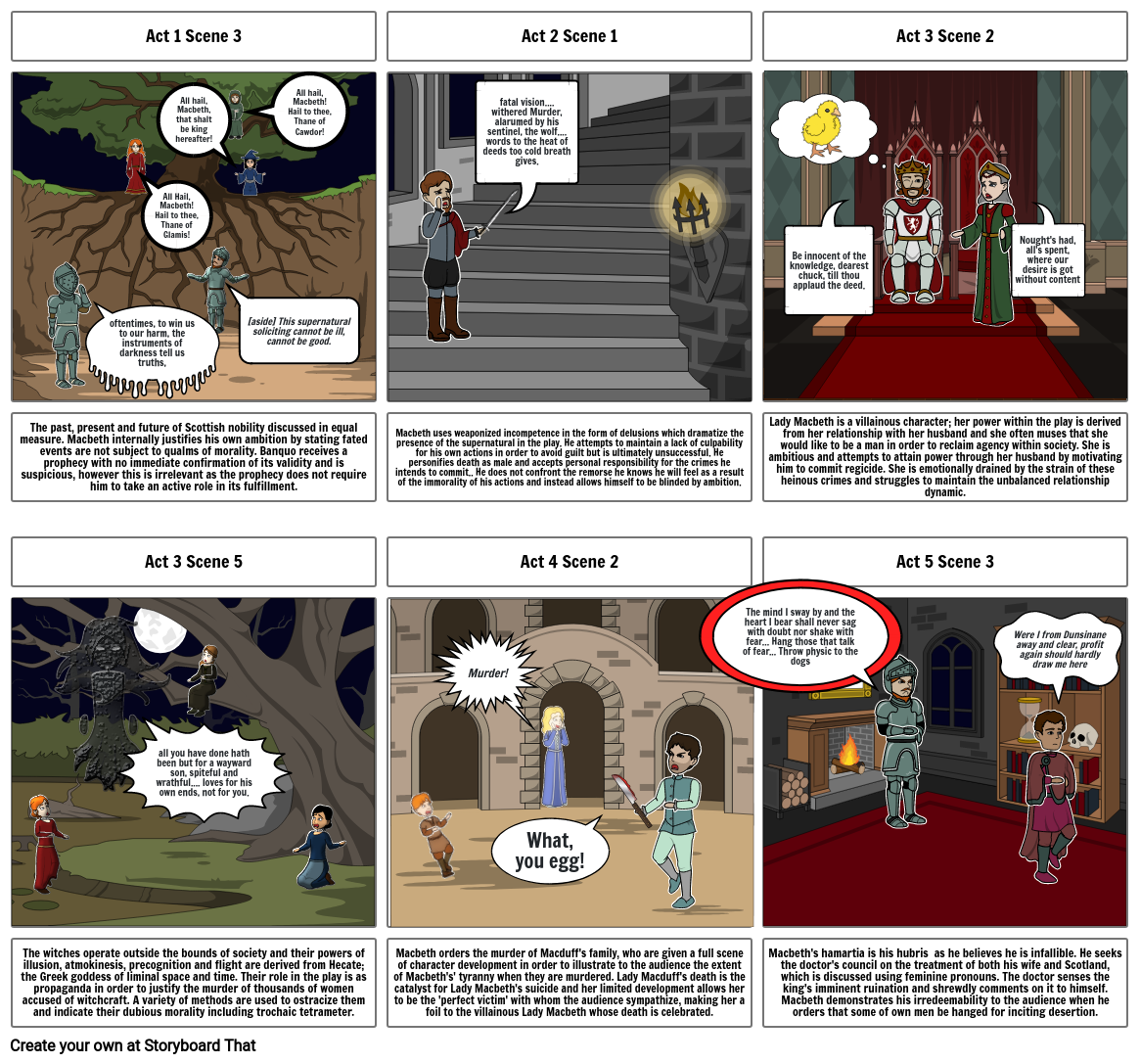Macbeth key scene summary

Süžeeskeem Tekst
- Act 1 Scene 3
- oftentimes, to win us to our harm, the instruments of darkness tell us truths,
- All Hail, Macbeth! Hail to thee, Thane of Glamis!
- All hail, Macbeth, that shalt be king hereafter!
- [aside] This supernatural soliciting cannot be ill, cannot be good.
- All hail, Macbeth! Hail to thee, Thane of Cawdor!
- Act 2 Scene 1
- fatal vision.... withered Murder, alarumed by his sentinel, the wolf.... words to the heat of deeds too cold breath gives.
- Act 3 Scene 2
-
- Be innocent of the knowledge, dearest chuck, till thou applaud the deed.
- Nought's had, all's spent, where our desire is got without content
- The past, present and future of Scottish nobility discussed in equal measure. Macbeth internally justifies his own ambition by stating fated events are not subject to qualms of morality. Banquo receives a prophecy with no immediate confirmation of its validity and is suspicious, however this is irrelevant as the prophecy does not require him to take an active role in its fulfillment.
- Act 3 Scene 5
- Macbeth uses weaponized incompetence in the form of delusions which dramatize the presence of the supernatural in the play. He attempts to maintain a lack of culpability for his own actions in order to avoid guilt but is ultimately unsuccessful. He personifies death as male and accepts personal responsibility for the crimes he intends to commit.. He does not confront the remorse he knows he will feel as a result of the immorality of his actions and instead allows himself to be blinded by ambition.
- Act 4 Scene 2
- Murder!
- The mind I sway by and the heart I bear shall never sag with doubt nor shake with fear... Hang those that talk of fear... Throw physic to the dogs
- Lady Macbeth is a villainous character; her power within the play is derived from her relationship with her husband and she often muses that she would like to be a man in order to reclaim agency within society. She is ambitious and attempts to attain power through her husband by motivating him to commit regicide. She is emotionally drained by the strain of these heinous crimes and struggles to maintain the unbalanced relationship dynamic.
- Act 5 Scene 3
- Were I from Dunsinane away and clear, profit again should hardly draw me here
- The witches operate outside the bounds of society and their powers of illusion, atmokinesis, precognition and flight are derived from Hecate; the Greek goddess of liminal space and time. Their role in the play is as propaganda in order to justify the murder of thousands of women accused of witchcraft. A variety of methods are used to ostracize them and indicate their dubious morality including trochaic tetrameter.
- all you have done hath been but for a wayward son, spiteful and wrathful.... loves for his own ends, not for you.
- Macbeth orders the murder of Macduff's family, who are given a full scene of character development in order to illustrate to the audience the extent of Macbeth's' tyranny when they are murdered. Lady Macduff's death is the catalyst for Lady Macbeth's suicide and her limited development allows her to be the 'perfect victim' with whom the audience sympathize, making her a foil to the villainous Lady Macbeth whose death is celebrated.
- What, you egg!
- Macbeth's hamartia is his hubris as he believes he is infallible. He seeks the doctor's council on the treatment of both his wife and Scotland, which is discussed using feminine pronouns. The doctor senses the king's imminent ruination and shrewdly comments on it to himself. Macbeth demonstrates his irredeemability to the audience when he orders that some of own men be hanged for inciting desertion.
Loodud üle 30 miljoni süžeeskeemi

